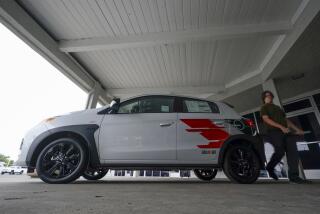Deal Would Give DaimlerChrysler Foothold in Asia
- Share via
BERLIN — DaimlerChrysler’s announcement Monday that it will buy a 34% stake in Mitsubishi Motors Corp. gives the German-American company a fighting chance to meet goals of controlling 25% of the fast-growing Asian market as well as demands in Europe and the U.S. for cars that are more fuel-efficient and less polluting.
For the auto giant that was created in 1998 by fusing Daimler and Chrysler Corp., the effective takeover of the debt-ridden Japanese firm would fill in the blanks of a global development strategy while allowing the combined company to stay focused on its signature product: the glamorous but gas-guzzling Mercedes-Benz.
The $2-billion acquisition would give DaimlerChrysler the small-car expertise it needs to produce automobiles that can meet tougher environmental standards that will come into force this decade in the European Union. DaimlerChrysler, which would become the world’s No. 3 auto group behind American giants General Motors Corp. and Ford Motor Co., also expects to take advantage of Mitsubishi experience and platforms to expand its ultra-compact Smart car lineup on the Continent.
“With the giant footprint of this group in the worldwide automotive market, we’re now where we always wanted to be,” DaimlerChrysler Chairman Juergen Schrempp told journalists after announcing the deal, which is subject to shareholder and regulatory approval.
Mitsubishi’s U.S. sales and distribution arm, based in Cypress, is the most profitable part of the company and, along with the company’s other North American operations, is not expected to be hurt in the deal.
“We have been told that management will remain the same, and all the documents we’ve received over the past few days show that DaimlerChrysler will be looking for ways to cooperate even more [in the U.S.],” said Kim Custer, spokesman for Mitsubishi Motor Sales of America.
The U.S. company, started in 1982, has about 850 employees in Orange County and 250 others in regional offices throughout the nation.
Custer said Mitsubishi expects to see more involvement by DaimlerChrysler in product development in the United States, including a search for manufacturing efficiencies that could see Mitsubishi’s Illinois plant turning out more Dodges and Chryslers.
DaimlerChrysler had to overcome significant cultural clashes in merging its U.S. and German operations less than two years ago, and frictions are predicted as the Atlantic partnership seeks to integrate new colleagues from yet another part of the world. The Japanese industry’s tradition of lifelong employment and more defined and constricted labor-management relations bears more resemblance to the old German way of doing business than the synergy-seeking focus of Schrempp and his American executives.
Those concerns notwithstanding, the deal would give DaimlerChrysler significant traction in Asia.
Since its November 1998 merger with Chrysler, the venerated Stuttgart producer has set a goal of 2008 for commanding at least 25% of the Asian market, which its analysts expect to grow as much as 10% a year as the region climbs out of its recent economic woes. Growth is pegged at barely 1% a year in Europe and only slightly higher, at 1.25%, for North America. At present, DaimlerChrysler has less than 4% market share in Japan, Korea and Southeast Asia, while the combined market share with Mitsubishi would be nearly 11% in Japan and 9.4% elsewhere in the Asian Pacific.
“We have closed the circle. We have covered all the markets of the world,” Schrempp said, predicting the alliance would soon give DaimlerChrysler 20% of its sales in Asia.
For Mitsubishi, which carries $16 billion in debt, the partnership would provide a much-needed source of cash without forcing it to surrender its prized truck division or day-to-day management. However, DaimlerChrysler’s three members on the 10-person board would have veto power in certain strategic decisions.
“With this alliance, we will get access to additional resources,” Mitsubishi President Katsuhiko Kawasoe said. “DaimlerChrysler will add potential economies of scale which will enhance the future of our business. We will be able to intensify our activities outside Asia, primarily in Europe and North America.”
Mitsubishi’s U.S. sales and distribution arm is the most profitable part of the entire company and along with other North American operations is not expected to be hurt in the deal.
“We have been told that management will remain the same, and all the documents we’ve received over the past few days show that DaimlerChrysler will be looking for ways to cooperate even more,” said Kim Custer, spokesman for Cypress-based Mitsubishi Motor Sales of America.
The company has about 850 employees in Orange County and 250 more in regional U.S. offices.
Custer said Mitsubishi expects to see more involvement with DaimlerChrysler in the U.S., including a search for manufacturing efficiencies that would see the 3,800-employee Mitsubishi Motor Manufacturing of America plant in Normal, Ill., which already builds the Dodge Stratus and Chrysler Sebring coupes, turn out other DaimlerChrysler models as well.
The Japanese auto maker’s shares rose 12% in Tokyo, and DaimlerChrysler saw a more than 2% rise in Frankfurt. In New York Stock Exchange trading, DaimlerChrysler shares lost 31 cents to close at $67.19.
*
Times staff writer John O’Dell contributed to this report.






